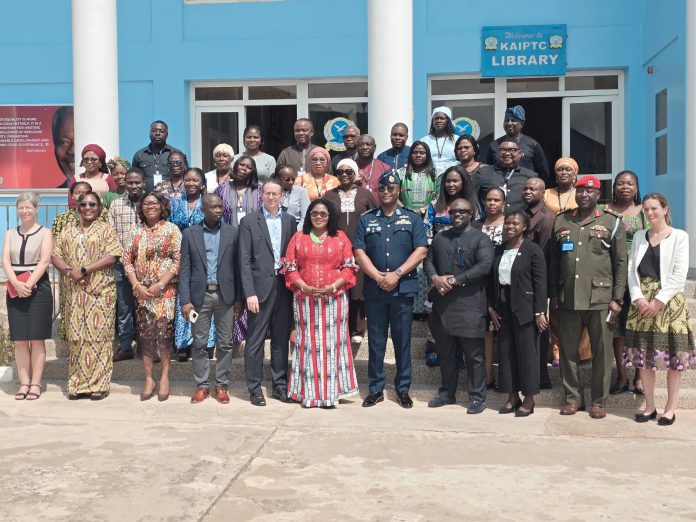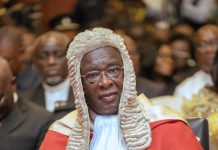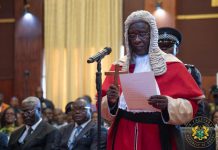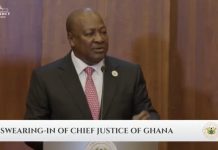The Minister for Gender, Children and Social Protection, Dr. Agnes Naa Momo Lartey, has called for stronger coordination, leadership and innovation in advancing the Women, Peace and Security (WPS) agenda across West Africa.
She made the call on Monday during the opening of a five-day Strategic Leadership Training for the ECOWAS WPS Regional Steering Group at the Kofi Annan International Peacekeeping Training Centre (KAIPTC) in Accra.
Delivering her keynote address, Dr. Lartey underscored the significance of the training, which comes as the global community marks 25 years of the adoption of UN Security Council Resolution (UNSCR) 1325.
She described the programme as timely, noting that it equips national focal persons with the advanced skills needed to strengthen leadership, coordination and the overall effectiveness of WPS interventions in the sub-region.
She projected Ghana’s progress in implementing UNSCR 1325 through successive National Action Plans, including GANAP I (2012) and GANAP II (2020–2025).
According to her, Ghana continues to demonstrate continental leadership in promoting women’s participation, protection and leadership in peace and security processes.
Among the major achievements she cited were the passage of the Affirmative Action (Gender Equality) Act, 2024 (Act 1121), the appointment of gender focal persons across the security services, and the operationalisation of gender-sensitive policies within the Ghana Armed Forces, Police Service, Immigration Service and the Prisons Service.
She also noted that under President Mahama’s leadership, Ghana now has its first female Vice President, who also chairs the Ghana Armed Forces Council — a milestone she described as “monumental for gender inclusivity.”
Dr. Lartey commended institutions such as KAIPTC for their role in training women peacekeepers and mediators, and urged participants to take full advantage of the training to address emerging threats including violent extremism, political instability and climate-related conflicts.
Mr. Olatunde Olayemi, Programme Officer for Social Affairs at the ECOWAS Commission, reiterated the regional body’s commitment to strengthening WPS implementation despite significant challenges.
He noted that 14 of the then 15 ECOWAS member states had developed National Action Plans on WPS, although the withdrawal of three countries from the bloc had slowed progress.
He added that key regional achievements such as the adoption of the first ECOWAS Regional WPS Report and the establishment of the WPS Regional Steering Group in 2023, which has since developed its first strategic plan.
Nine in-country capacity-building programmes have also been completed across member states, he added.
Mr. Olayemi outlined the objectives of the training, including enhancing leadership, negotiation and stakeholder engagement skills; aligning national WPS mechanisms with regional frameworks; and supporting countries to develop context-specific coordination plans.
He expressed confidence that the calibre of trainers and participants would ensure the training’s success.
The Country Director of GIZ Ghana, Dr. Dirk Assmann, reaffirmed the commitment of the German Government and the European Union to supporting ECOWAS in deepening gender-responsive peace and security initiatives.
He emphasised that sustainable peace is impossible without the meaningful participation of women at all decision-making levels.
The ECOWAS Peace, Security and Governance (EPSG) Project — funded by Germany and the EU — therefore prioritises strengthening institutional capacities and promoting inclusive, evidence-based policies.
Dr. Assmann urged national focal points not to underestimate their role, describing them as “the backbone of national efforts” to implement the WPS agenda. He expressed strong support for continued collaboration with KAIPTC, the Geneva Centre for Security Policy and other partners.
Commandant of the KAIPTC, Air Commodore David Anetey Akrong, reaffirmed the Centre’s dedication to advancing the WPS agenda through research, dialogue and capacity building.
He stressed that despite progress across Africa — including widespread ratification of the Maputo Protocol and adoption of WPS Action Plans — persistent challenges such as weak coordination, limited resources and inadequate female representation require renewed strategic leadership.
The training, developed by the KAIPTC’s Women, Youth, Peace and Security Institute in partnership with the Geneva Centre for Security Policy and GIZ, will cover systems strengthening, negotiation, simulation-based learning, stakeholder mapping and strategic communication.
Towards Stronger Regional Action
Organisers and partners — including the African Union, ECOWAS Commission, GCSP, GIZ and the German Government — expressed hope that the workshop will deepen collaboration among member states and strengthen ECOWAS’s WPS architecture.
Participants were encouraged to engage actively, share experiences and build networks that will drive more coordinated and impactful implementation of the WPS agenda across West Africa.
The EPSG project is commissioned by Germany, co-funded by the European Union, and jointly implemented by GIZ, Expertise France and FIAP, in partnership with the ECOWAS Commission.









